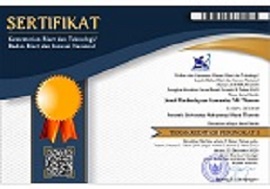Education on the Impact of Fast Food Consumption on Anemia Among Adolescent Students at Bina Husada Mandiri Vocational School, Bekasi.
DOI:
https://doi.org/10.37012/jpkmht.v7i2.2891Abstract
The most important nutritional problem in Indonesia is anemia. Causes of anemia include infectious diseases, lack of intake (nutrients, folic acid, or vitamin B12), menstrual bleeding, and a lack of knowledge about anemia. To prevent anemia, teenagers can optimize their consumption of foods containing these nutrients. Factors causing anemia in adolescent girls include lifestyle choices, such as poor diet and insufficient vegetable consumption. As teenagers, they often enjoy consuming fast food. Fast food is food that is served quickly, but apart from its practical presentation and delicious taste, the impact of consuming fast food on body health is very bad, one of which is anemia, as anemia is related to menstruation and will persist if not balanced with a nutritious diet where adolescence is a period of growth. The activity began with a site survey and permitting process, along with 40 female students from SMK Bina Husada Mandiri Bekasi. Forty students participated in the activity, which included educational outreach on the impact of fast food consumption on anemia among female students. It is hoped that this education will help prevent anemia in adolescent girls early on. The results of this community service activity can serve as a reference for improving public health and adolescent reproductive health programs.
Downloads
Published
Issue
Section
Citation Check
License
Copyright (c) 2025 Sundari Fatimah, Ratna Mutu Manikam, Nurma Dewi

This work is licensed under a Creative Commons Attribution 4.0 International License.
Jurnal Pemberdayaan Komunitas MH Thamrin allows readers to read, download, copy, distribute, print, search, or link to the full texts of its articles and allow readers to use them for any other lawful purpose. The journal allows the author(s) to hold the copyright without restrictions. Finally, the journal allows the author(s) to retain publishing rights without restrictions Authors are allowed to archive their submitted article in an open access repository Authors are allowed to archive the final published article in an open access repository with an acknowledgment of its initial publication in this journal.

Lisensi Creative Commons Atribusi 4.0 Internasional.













